For many years Thailand has received support from international organizations and from developed countries like Japan. Thailand has achieved growth faster than the other Mekong countries, and now JICA is supporting Thailand's efforts to assist other developing countries as part of the international community.
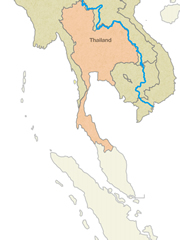
Thailand and Japan – Supporting Developing Countries Together
Since the 1980s, Thailand has actively used aid and private investment from foreign countries, including Japan, to enhance its development. Thailand now has a broad base of supporting industries in the automobile, electrical, and electronics sectors that produce essential parts and materials, encompassing the entire process of assembly, sale, and export. People's income has increased, and Thailand became a middle-income country in 2011. In 2017, its gross national income (GNI) per capita was USD 5,950 (World Bank).
Thailand's recent economic development has allowed it to become an emerging donor that supports developing countries. This type of support, where a developing country that has achieved rapid progress in a certain area supports another developing country, is called "South-South cooperation."
Thailand has three characteristics allowing it to effectively provide support: firstly, it has knowledge from having received support in the past; secondly, it has experience from having grown from a low-income to a middle-income country; and thirdly, it has many geographical and cultural similarities to nations in the Mekong region. Given Thailand's similarity to these developing countries, JICA expects that such cooperation between Thailand and Japan for other countries will be beneficial to Japan, Thailand, and the countries receiving support, and is playing an important role in bolstering this development cooperation.
In 1994, Japan and Thailand initiated the Japan-Thailand Partnership Program, and Thailand, which receives funds and technology from JICA, runs the Third Country Training Program (TCTP), under which from neighboring developing countries Thailand invites trainees to participate in technical cooperation.
Mr. Panuwat Triyangkulsri, Inspector-General of the Thai Ministry of Industry, elaborates on the significance of running triangular cooperation and TCTP with JICA.
"The biggest thing is peace of mind. Thailand has enjoyed support from JICA and the Japanese private sector for many years now, and Japanese technology is firmly established here. So it's extremely reassuring that Japan is working with us to provide support. And it isn't just us—the country being supported feels reassured too."
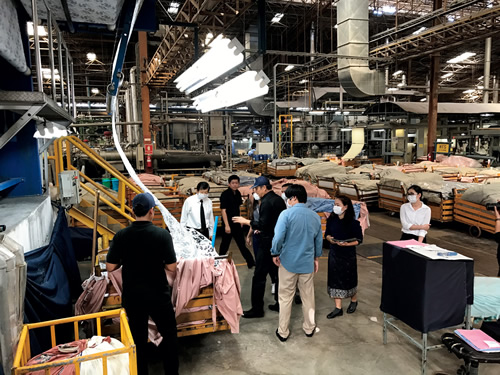
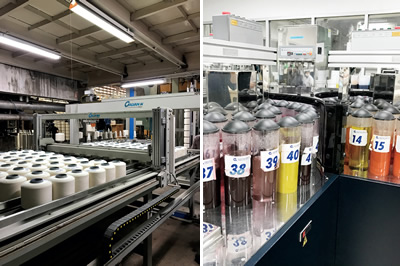
Trainees learn about clothes manufacturing at a factory in Bangkok as part of the dyeing course.
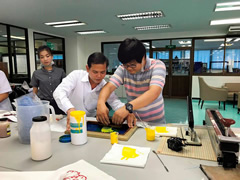
Trainees learn about textile processing and printing at the testing center of a Thai fiber research center.
Training People to Develop the Region
In recent years, more Japanese companies doing business in Thailand are adopting the "Thailand-Plus-One" strategy, in which part of the manufacturing process is shifted to a different Asian country to reduce production costs. In response, JICA and the Thai Ministry of Industry are accelerating the pace of developing supporting industries to attract investors to the Mekong region. Since 2015, through the TCTP course "Materials Processing Technology for Mekong Countries," Thailand has been training leaders of governments and private sector organizations from the other countries in a range of technologies such as machinery, plastics, electronic controllers, fiber dyeing, and welding.
Each time a training course is completed, Thai representatives are sent to the various countries to monitor progress in the adoption of technology in the country, and to study whether the course materials presented in Thailand were appropriate for that country. "To teach something to others is challenging and requires a lot of patience. In spite of this, Japan has pursued human resource development very seriously. We will learn from this and improve our performance," says Mr. Triyangkulsri. Many people at the Thai Ministry of Industry are already familiar with JICA's approach to assistance. Moreover, Thailand understands the effectiveness of the approach, and is adopting it to stimulate new growth in the Mekong region.
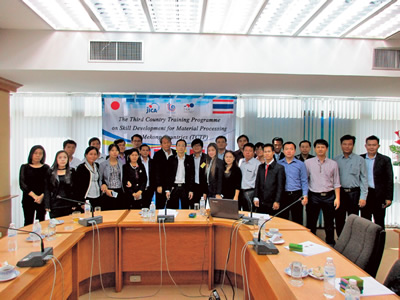
Twenty trainees from Cambodia, Laos, Myanmar, and Vietnam participated
Panuwat Triyangkulsri
Inspector-General, Thai Ministry of Industry
After study in Japan, Mr. Triyangkulsri entered the Thai Ministry of Industry in 1989. He has since worked to develop Thailand while receiving Japanese support, and is now working with JICA to promote the TCTP. "Thailand has a declining birth rate and an aging population. In response, we want to develop supporting industries in the Mekong countries, and see new industries adopting automation and utilizing robots in Thailand. We wish to build win-win relationships that will foster growth for the whole region."





scroll